 Kathy Bowland earned her Master’s Degree in Electrical and Electronics Engineering from the University of Illinois Urbana-Champaign and her Bachelor’s Degree in Electrical and Electronics Engineering from the University of Tennessee-Knoxville. Here she shares a little about her career and the inspiration behind it. What is your specific area of STEM? Electrical Engineering How would you explain your STEM field to young girls? I work with electricity to make things or solve problems, like getting Wifi/the internet to work in your house or making a television. In a piece of equipment, there are a lot of electric circuit boards, which directs electricity to go along certain paths to do specific things - like light up a TV. LED. What traits might a child possess that may indicate an interest or aptitude for your STEM field? Curiosity, creativity, patience, spatial awareness. What did you know about your STEM field when you were a child? I never really did any STEM activities as a child other than developing spatial awareness through Spirograph drawing toys and learning to read maps. My dad was always there to answer questions if I had any but I was never forced to do STEM activities. I joined science club for 1 year in 6th grade and had a great time experimenting with the science equipment after school with my friends where there were no grades and no pressure to complete an activity in front of my peers. Why did you choose your STEM field? Were you inspired by someone? I took a physics class in high school and I loved it! Circuits were so fun - like puzzles. My high school physics teacher also had us think up experiments to prove physical laws, which was pretty cool. What are some really cool things that people in your profession work on? Make videos in simulations (...ok, this doesn't sound cool but the videos are pretty great!), measure things outdoors and in anechoic chambers. I can also build antenna to make things fancier at home - improve the wifi in a room of the house or build a directional antenna to more easily capture over the air signals (google ‘cantenna’ for that one!). What inspirational message would you give young girls to inspire them to pursue STEM? If you're at all interested in STEM, I really encourage you to look at the careers available. There is a HUGE variety of jobs! From big-picture teamwork activities in a manufacturing plant to tinkering by yourself in a lab, you can find a job that really plays to your strengths where you can excel. Thank you for contributing, Kathy!
0 Comments
 Melissa Rost earned her MS in Statistics and BS in Applied Mathematics, both from Georgia Tech. Here she shares a little about her career and the inspiration behind it. What is your specific area of STEM? Applied Mathematics and Statistics How would you explain your STEM field to young girls? I analyze data from many different fields to try to make sense of it and to try to gain a better understanding of what is really going on, how something could be improved, or to predict an outcome from the data available. What traits might a child possess that may indicate an interest or aptitude for your STEM field? Just enjoying math in general as a child and through high school might indicate an aptitude towards studying math since so many children dislike math. For STEM fields more broadly, I think a general curiosity about the world and asking questions about how and why things work in a certain way might indicate an aptitude. What did you know about your STEM field when you were a child? I knew that I always enjoyed math growing up and that I was really good at it. I remember having so much fun during the summers doing the extra problems from the math workbooks. My mom also has a math degree so I remember hearing about her working with numbers for her job, but I don't think I knew much about career options with a math degree outside of her job. Why did you choose your STEM field? Were you inspired by someone? When I was applying to Georgia Tech, I remember looking over all of the majors and honestly not knowing what any of the specific types of engineers were. I remember being told that my grandfather was an engineer when I was a kid, but no one ever told me what type, so I honestly didn't really know there were types until then. When I saw math, I knew I loved math and that I was really good at it, so it seemed like a great choice. And it was. I loved my classes and I loved learning and proving why something was true and not just taking it to be true just because. I took engineering classes and really saw the difference between the ‘math’ thought process and an engineering one, which has more of a focus on taking the result that is assumed to be true and applying it to solve problems. I love asking questions and I love knowing the details of ‘why’ so seeing the engineering side further confirmed to me that math was the right choice. What are some really cool things that people in your profession work on? Data is everywhere, so really data analysis has a place everywhere and you could work in whatever field you want! There are people who analyze sports data, manufacturing and sales data from things like toys, health data - everything! What inspirational message would you give young girls to inspire them to pursue STEM? You are just as capable as the boys despite what anyone tells you so go for it! Thank you for contributing, Melissa! 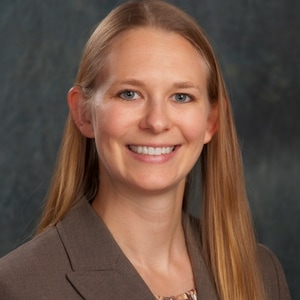 Kendra Schuettpelz earned her optical engineering degree from Rose-Hulman Institute of Technology. Here she shares a little about her career and the inspiration behind it. What is your specific area of STEM? Optical Engineering How would you explain your STEM field to young girls? I play with lasers. I work with lenses to manipulate how light moves through systems like cameras. What traits might a child possess that may indicate an interest or aptitude for your STEM field? Playing with laser pointers, using mirrors to manipulate where the laser beam goes. Playing with magnifying glasses and focusing the light to a point to see what you can set on fire. What did you know about your STEM field when you were a child? I didn't realize STEM was something that women didn't do. My parents encouraged me to do whatever I loved. In Girl Scouts we also did some science things... we spent a lot of time outside with bugs and stuff. Somewhere I learned that I wanted to be an astronaut, then in high school I looked into what majors in college I should study to be an astronaut. Why did you choose your STEM field? Were you inspired by someone? My high school physics teacher had a HUGE impact on me with all the fun hands on experiments. He also taught an astronomy course, and again it was the engagement that I loved! We had to go look at the sky for astronomy class, not just look at pictures in a textbook. What are some really cool things that people in your profession work on? Most of my work right now is lidar (light detection and ranging). We build systems that use lasers to characterize the atmosphere (optical turbulence, water vapor profiles, and atmospheric transmission) or to map the sea floor and land profiles. Some optical engineers also work with the medical field, creating lasers that are used in surgeries. Some optical engineers design car headlights or warehouse lighting. Anywhere that you see light, lenses, or laser, an optical engineer has been involved. What inspirational message would you give young girls to inspire them to pursue STEM? Do you what you love! With STEM the possibilities are endless and you have the ability to change the world! Thank you for contributing, Kendra! 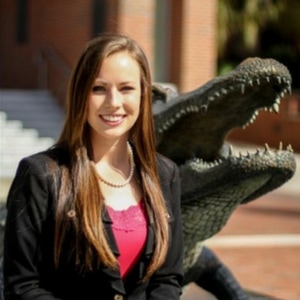 Marissa Buck is pursuing her chemical engineering degree from the University of Florida. Here she shares a little about her career and the inspiration behind it. What is your specific area of STEM? Chemical Engineering How would you explain your STEM field to young girls? Chemical engineers use chemistry, math, and physics to make products that are used around the world. Chemicals are in everything - food, makeup, clothing, medicine, gasoline - and chemical engineers are needed to make a large amount of these products for all the people who use them. What traits might a child possess that may indicate an interest or aptitude for your STEM field? I really enjoyed puzzles, building things from legos, putting together furniture with my dad, and drawing/painting. The puzzles enhanced critical thinking skills that are important for engineering. The arts helped develop creativity that is important for finding innovative solutions to problems. The hands-on activities showed how I liked to know how things were made, and I liked being a part of that process. Engineers get to be a part of that creation process for many different things. What did you know about your STEM field when you were a child? I did not know what engineering was a child. I learned about STEM in the 6th grade when my science teacher told the girls about a STEM program at a local university. They took girls in for a day and did various science experiments at the university. It was a fun, engaging day and it made the girls interested in the science behind it all. In the 8th grade, a speaker at a Mathletes competition spoke about engineering. He gave out pamphlets and I read a little about it. Originally I looked into environmental engineering because I was all about being green. It wasn't until 11th grade when I fell in love with chemistry and heard about chemical engineering from college pamphlets. Why did you choose your STEM field? Were you inspired by someone? I really enjoyed chemistry and math, but I did not want to be in a lab all day. I wanted to see products being made, and I wanted to be a part of that process. Chemical engineering was the best fit. Entering a male dominant field made me feel proud to show that women can succeed in engineering. What are some really cool things that people in your profession work on? Chemical engineers make the foods and drinks that you love- Kraft macaroni and cheese, Lays potato chips, Tropicana orange juice, Hershey's chocolate, etc. Also, chemical engineers help make the plastic and packaging that the food has to go into. Almost all packaged food has a chemical engineer helping to make it. They help make the flavor and make sure it stays consistent so every bite tastes as good as the last. They also do customer surveys to find out the flavors people like the best and flavors they want to have in the future. The packaging is also impressive with many machines that can melt plastic into different shapes, sizes, and textures in order to fit the food or drinks going inside. What inspirational message would you give young girls to inspire them to pursue STEM? Don't be afraid to do what you enjoy. Science is not a boy subject; it is for everyone. Science is not a nerdy subject; it is essential to everyday life Thank you for contributing, Marissa! 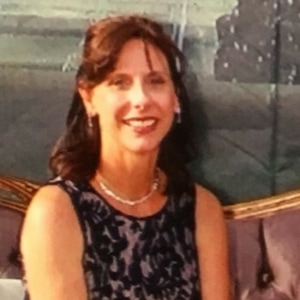 Sharon Diaz earned her doctorate from the University of South Florida College of Medicine. Here she shares a little about her career and the inspiration behind it. What is your specific area of STEM? Medical sciences/medical research. How would you explain your STEM field to young girls? Medical researchers study how our body works and what happens when our bodies don't work well. We try to discover ways to prevent diseases and provide cures for things like cancer, diabetes, etc. What traits might a child possess that may indicate an interest or aptitude for your STEM field? Children who ask the "why" questions are demonstrating a natural curiosity about how things work. They aren't satisfied with just knowing facts but also understanding how and why those conclusions were made. What did you know about your STEM field when you were a child? When I was a child I did not know medical researchers existed. My interest in science peaked in high school when I was exposed to biology and had an amazing teacher, Mrs. Parker. Why did you choose your STEM field? Were you inspired by someone? I was inspired to become a medical researcher when a tragedy changed my life in high school. My smart, amazing, friend was diagnosed with cancer and passed away within months of his diagnosis. I kept asking myself "why can't we cure cancer"? I decided I wanted to make a difference in the fight against cancer. What are some really cool things that people in your profession work on? Medical researchers get to work in laboratories where they create (design), carry out (implement), and think about what the results mean (analyze) in experiments. My favorite part of being a researcher was getting to look through a microscope and discovering a living world that's invisible to our eyes! Microscopes make something small seem much bigger, kind of like a magnifying glass. Our eyes can't see it, but our bodies battle everyday to keep us healthy. Think of the Superheroes you read about or see in the movies. In our bodies, the Superheroes are our immune cells. They are the good guys that defend our bodies against the villains. The villains are things that cause disease like bacteria, viruses, cancer cells and other things that can make us sick. Medical researchers find ways to help our Superheroes (immune cells) defend our bodies against disease. What inspirational message would you give young girls to inspire them to pursue STEM? If you want to learn about why our bodies work the way they do and help find ways to keep people from getting sick, then think about becoming a medical researcher. We still haven't discovered a cure for many kinds of cancer but we are always looking for smart, curious girls to keep looking for answers! Thank you for contributing, Sharon! 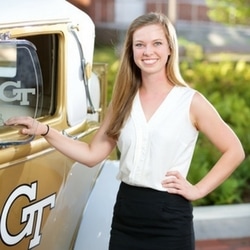 Jennifer Grigsby is pursuing her mechanical engineering degree at Georgia Tech. Here she shares a little about her career and the inspiration behind it. What is your specific area of STEM? Mechanical Engineering How would you explain your STEM field to young girls? Just about every product you come into contact with on a daily basis, big or small, was worked on by a mechanical engineer. Here are just a few examples:
The list goes on... mechanical engineering is a very broad field and there are infinite applications beyond making cars and building machines! What traits might a child possess that may indicate an interest or aptitude for your STEM field? Practical and creative thinking. Lots of engineers will say they were obsessed with Legos, Lincoln Logs, Marble Run, Hot Wheels, etc. when they were kids - or they took apart and rebuilt pens, TV remotes, desks, even computers. This enables them to work with their hands, which breeds spatial reasoning, an understanding of how things work, and a confidence in their ability to create – all essential to engineering, especially mechanical. What did you know about your STEM field when you were a child? I didn't know about engineering until high school, when I started looking at colleges. I was nudged toward it by teachers, college counselors, and my family since I was always good at math and science (of course, job security and salary were part of that encouragement too). I didn't know much about engineering, so I went to Cornell's summer engineering program for girls (CURIE Academy) to learn about the different opportunities in each field and was able to dip my feet in the water by working on a robotics project with a team. After that, I had a better understanding on what engineers do, and knew I wanted to be one! Why did you choose your STEM field? Were you inspired by someone? I chose mechanical engineering kind of arbitrarily because I can go in virtually any direction I want since mechanical engineering is so broad. I think it's a good fit for me because it allows me to think about how things work in a tangible way, I get to work with my hands, and I can apply the things I've learned in school (mechanics, fluid dynamics, system dynamics, thermodynamics, heat transfer, design & manufacturing principles, etc.) to pretty much anything you can think of. What are some really cool things that people in your profession work on? There are so many cool things you can do with Mechanical Engineering. You could design parts of an airplane, test the aerodynamics of cars in a wind tunnel, work on a satellite that will be launched into space, design and manufacture toys, build robots, anything! At my current job as a co-op at GTRI's Electro-Optical Systems Lab, I get to design, order (or sometimes make them myself on a 3D printer), test, and assemble mounting structures for optical, electrical, and mechanical components in laser systems. It's so cool to me that the parts that I've designed actually work and are important to the functionality of the system - that I contributed to a lidar system that will go onto a US Navy destroyer-class ship and help protect our country! What inspirational message would you give young girls to inspire them to pursue STEM? Try and get exposure to and experience in different STEM fields so you can discover what you like (and don't like)! I may not have gone into engineering if I hadn't sought out a summer engineering program like the one I did at Cornell, but boy am I glad I did. Thank you for contributing, Jennifer! 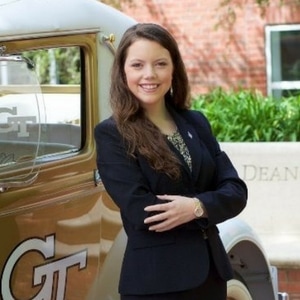 Julia Macon is pursuing her aerospace engineering degree at Georgia Tech. Here she shares a little about her career and the inspiration behind it. What is your specific area of STEM? Aerospace Engineering How would you explain your STEM field to young girls? We design and build planes and rockets and satellites and everything else that flies or goes into space. What traits might a child possess that may indicate an interest or aptitude for your STEM field? Knack for building/inventing things, interest in astronomy and space, interest in learning how planes and rockets work, good at physics or understands the way things move and interact with each other. What did you know about your STEM field when you were a child? I knew that aerospace engineers sent people to space and rovers to Mars. Also I guess I knew they built planes but I was more into space. My dad had me help him build a bunch of stuff around the house growing up. We built a telescope together and looked at Saturn. My parents always encouraged me and my siblings to follow our interests, and teachers at school (particularly science teachers) fueled my curiosity. It helped that I caught on to basic science principles really easily. Why did you choose your STEM field? Were you inspired by someone? I like space and want to be an astronaut so it was a pretty easy choice. What are some really cool things that people in your profession work on? Astronauts, all things at NASA. If you watch the movies Apollo 13 or Martian, they will give you a pretty good idea of the cool stuff we can do in our job. A lot of students at my school work on satellite projects that will actually be launched into space so that's also cool. You might get to build things like the next Mars rover. On the aircraft side of things, we design and build new planes and also fix old ones. This can be the commercial aircraft you fly on when you travel, or fighter jets. Several aerospace engineers also have their pilot’s license – it’s not really part of the job but is still a cool thing to think about! Thank you for contributing, Julia!  Emelia Funnell is pursuing her biomedical engineering degree at Georgia Tech. Here she shares a little about her career and the inspiration behind it. What is your specific area of STEM? Biomedical Engineering How would you explain your STEM field to young girls? Biomedical engineering focuses on developing medical technologies to help people with medical conditions or disabilities. For example, a biomedical engineer might help someone with only arm by developing a prosthetic (or fake) arm for them to use. What traits might a child possess that may indicate an interest or aptitude for your STEM field? I believe question-asking and answer-seeking is definitely a trait indicating early aptitude for engineering. As for the biomedical focus of engineering, a child may show signs of caring for other people's lives and wanting to help improve the lives of those who are in suffering. What did you know about your STEM field when you were a child? To be honest, I didn't think seriously about what I wanted to study until going into high school. As a child, I just wanted to be a professional soccer player. However, throughout my primary and secondary education, I was drawn to math and science and encouraged to really commit to those subjects. Why did you choose your STEM field? Were you inspired by someone? I knew I liked math and problem solving, but I wasn’t sure what I wanted to do. The summer before my first semester of college I had an eye doctor appointment for a check up, but mostly just to get an updated prescription for contacts. After examining my eye, my optometrist said that my optic nerves appeared to be swollen -- an indicator for various other medical concerns, including brain tumor. I was sent straight to the hospital, as that was the quickest way to have an MRI done. My MRI turned out completely normal, but I still had to see various specialists throughout the following weeks and months to try and diagnose the reason for the abnormal appearance of my optic nerves. In that claustrophobic MRI scanner as well as throughout my various tests and run-ins with medical technology, I had quite a bit of time to think about my future as well as the lives of people with diagnosed medical conditions. This experience is what made me realize the direction I wanted to take engineering and my career. What are some really cool things that people in your profession work on? Biomedical engineers make artificial organs and implement technologies that allow people to live improved lives. One research project that I was involved in was focused on finding preventative methods for concussions resulting from collisions in sports. My group and I did a lot of research to find out all of the biological processes behind concussions as well as what kinds of technology were already out there being used in the real world. We ended up producing various models of a cap that stimulates the neurons and happenings within the brain through the use of magnets. At the beginning of the project, we had no idea what we were going to do and felt completely lost, but it was really cool working it out with my group and seeing how far we progressed throughout the project. What inspirational message would you give young girls to inspire them to pursue STEM? If you like solving problems and exploring the reasons behind answers, I would really encourage you to pursue STEM, as there is nothing more rewarding than overcoming obstacles and finishing a project. And who knows, that project may one day be connecting parts of the world, leading towards a greener more sustainable Earth, or saving lives. Thank you for contributing, Emelia!  Gina Holden earned her computer engineering degree from Georgia Tech. Here she shares a little about her career and the inspiration behind it. What is your specific area of STEM? Computer Engineering How would you explain your STEM field to young girls? Software Engineers make computers able to understand what we want them to do. We take a human explanation of a problem and make machines able to solve it. What traits might a child possess that may indicate an interest or aptitude for your STEM field? Interest in math and logic. Analytical thinking skills. Interest and aptitude for algorithms and data structures and organization. What did you know about your STEM field when you were a child? Not much! I was always good at math and science so I went to a STEM high school where I received a broad exposure to many types of engineering. Only by doing a few different internships in high school in different fields (medicine, aviation, and then finally software) was I able to find my passion. Why did you choose your STEM field? Were you inspired by someone? I did not know anyone in software! I didn't even understand it was a career option until the summer before I went to college during an internship with a software company. This work was interesting to me so I took a chance and chose a major. Luckily it was a good fit! What are some really cool things that people in your profession work on?
What inspirational message would you give young girls to inspire them to pursue STEM? Technology is the future of everything and we need the smartest, brightest people working on solutions. We can never win if we leave half of those minds behind. {Everyone knows girls are smarter than boys :)} Thank you for contributing, Gina!  Andrea Ruiz is pursuing her industrial engineering degree at Georgia Tech. Here she shares a little about her career and the inspiration behind it. What is your specific area of STEM? Industrial Engineering How would you explain your STEM field to young girls? Industrial engineering is all about learning to make the world run better. What traits might a child possess that may indicate an interest or aptitude for your STEM field? Someone who is organized and likes to solve problems. What did you know about your STEM field when you were a child? Both of my parents were engineers. They inspired me. Why did you choose your STEM field? Were you inspired by someone? I wanted something that would not be the same every day. What are some really cool things that people in your profession work on? You could work at Disney! What inspirational message would you give young girls to inspire them to pursue STEM? You can do anything you set your mind to... so do it. Thank you for contributing, Andrea!  Emilie Pourchet is pursuing biomedical engineering at Georgia Tech and expects to earn her degree in 2018. Here she shares a little about her career and the inspiration behind it. What is your specific area of STEM? Biomedical Engineering How would you explain your STEM field to young girls? Work alongside doctors to make devices to help people with health issues. What traits might a child possess that may indicate an interest or aptitude for your STEM field? An interest in books, although a better indicator is if they are curious about how things work. Working with Legos or other building toys is also a sign. What did you know about your STEM field when you were a child? I knew very little. I didn't think STEM fields would be for me until about 10th grade. I have an older brother who is a computer science graduate, and grandparents, aunts and uncles who are all in STEM (my parents are in business and management though). My brother was the biggest influence on me and he is the one who stimulated my interest in science. Why did you choose your STEM field? Were you inspired by someone? My older brother is very passionate about science and he inspired me. What are some really cool things that people in your profession work on? Biomedical engineers help people who have health problems! Thank you for contributing, Emilie!  Allison Sellars is pursuing chemical engineering at Georgia Tech and expects to earn her degree in 2018. Here she shares a little about her career and the inspiration behind it. What is your specific area of STEM? Chemical Engineering How would you explain your STEM field to young girls? Chemical engineers use math and science, and combine pretty much all subjects and experiences, in order to solve all kinds of problems in the world. What traits might a child possess that may indicate an interest or aptitude for your STEM field? Legos, an active imagination, puzzles. What did you know about your STEM field when you were a child? I didn't know much as a child at all. It was probably not until I was a junior in high school when I learned about engineering and the term "STEM." I was always fairly good at the math and science classes through school and it was what I enjoyed doing. I think I learned about STEM from a combination of my parents and teachers and their encouragement. Why did you choose your STEM field? Were you inspired by someone? I didn't really know any engineers growing up at all. I was just encouraged to try it because it was a growing field and covered the subjects and topics I was interested in. What are some really cool things that people in your profession work on? Cool chemical experiments - making crystals, etc. I got to intern in a chemical plant where I saw all kinds of different equipment and even got to climb into some of the big machines. Chemical engineers work with a lot of cool equipment that do fancy things. What inspirational message would you give young girls to inspire them to pursue STEM? STEM can seem super intimidating and scary sometimes and it's super easy to say that "it's not for me" or "I won't be good at that," but you can do it. If I can do it, anyone can! You are never in it alone - people are always there to help you no matter what. It's the best decision that I made and I couldn't imagine myself doing anything else. It's amazing what you can do when you put your mind to it! Thank you for contributing, Allison!  Manon Magill earned her biomedical engineering degree from Georgia Tech. Here she shares a little about her career and the inspiration behind it. What is your specific area of STEM? Biomedical Engineering How would you explain your STEM field to young girls? Biomedical Engineering is a combination of engineering (building solutions) and medicine (treating patients). I basically use my engineering skills to create a solution for health problems, which can mean making new medicines, new implants, or new devices for doctors to use on patients. What traits might a child possess that may indicate an interest or aptitude for your STEM field? An interest in the human body and helping people, as well as an ability to think outside the box to create solutions. What did you know about your STEM field when you were a child? I had an interest in the medical field because my dad was in medical school, but I didn't know about biomedical engineering until high school. Why did you choose your STEM field? Were you inspired by someone? It's a combination of two things I love - medicine/the human body & creating solutions! What are some really cool things that people in your profession work on? Here are some examples:
What inspirational message would you give young girls to inspire them to pursue STEM? I love STEM because I love feeling like what I'm doing with my time will make a difference in the world! Without the STEM field, we wouldn't have computers, phones, apps, advancements in medicine, faster cars, planes, or space exploration. Don't let boys run the show - make sure you get in on the action! :) Thank you for contributing, Manon!  Maria Auslander earned her industrial engineering degree from Georgia Tech. Here she shares a little about her career and the inspiration behind it. What is your specific area of STEM? Industrial and Systems Engineering How would you explain your STEM field to young girls? Most engineers make things, industrial engineers make things better. We improve existing processes. What traits might a child possess that may indicate an interest or aptitude for your STEM field? The ability to do chores efficiently, finding the quickest way to do things. What did you know about your STEM field when you were a child? My father is a mechanical engineer, so I grew up knowing about engineering. Why did you choose your STEM field? Were you inspired by someone? I was inspired by my father and I've always loved math. What are some really cool things that people in your profession work on? Industrial engineers help redesign hospitals so doctors and nurses can help their patients quicker and help more people. What inspirational message would you give young girls to inspire them to pursue STEM? People in STEM are the inventors of our world, they work in order to make our planet a better place for everyone. Thank you for contributing, Maria! 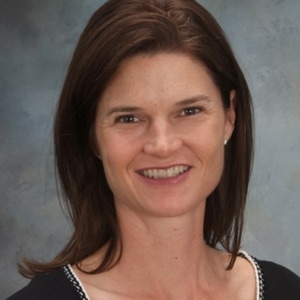 Karen Aspelin earned her undergraduate civil engineering degree from the University of Virginia and her Master’s from Texas A&M University. Here she shares a little about her career and the inspiration behind it. What is your specific area of STEM? Civil Engineering, Transportation and Traffic How would you explain your STEM field to young girls? I help to plan and design the roadway system that you drive, ride your bike, and walk along every day. What traits might a child possess that may indicate an interest or aptitude for your STEM field? Playing with Legos, cars, especially cars on roads. Also enjoying mazes and other puzzles. What did you know about your STEM field when you were a child? I didn't know anything about the field I ended up in. It wasn't until I was in college that I learned about my career field, and that was through a required engineering class. Why did you choose your STEM field? Were you inspired by someone? When I got out of college I was working in a different STEM field (environmental engineering) but wasn't happy in my job. A friend I had gone to college with told me he was in a master's program that focused on transportation engineering. Once I started that program I knew it was the field for me. What are some really cool things that people in your profession work on? Sometimes when I drive on a road or ride my bike on a trail, I am able to say, "I designed this!" It's so cool to have a product from your work that is used by so many people. What inspirational message would you give young girls to inspire them to pursue STEM? My career in the STEM field allows me make a great salary, work flexibly, and be a mom. Thank you for contributing, Karen! |
Participate!Women in STEM, we invite you to take our survey. You'll inspire young girls and contribute to the success of the STEM Girls Books series! Categories
All
Archives
March 2020
|

 RSS Feed
RSS Feed